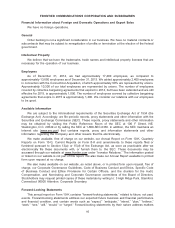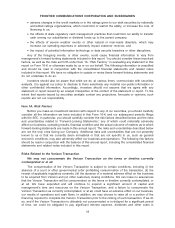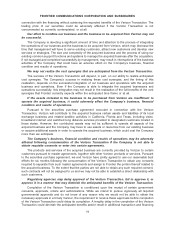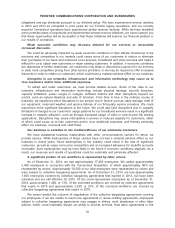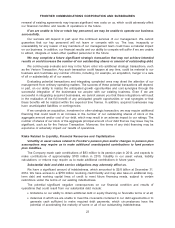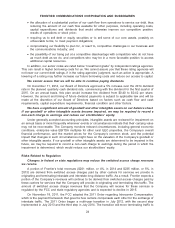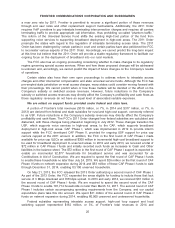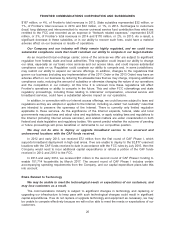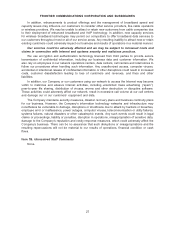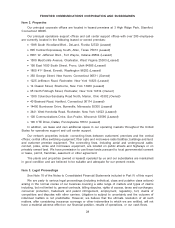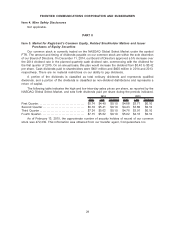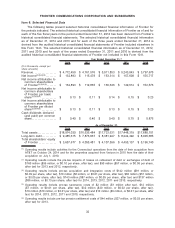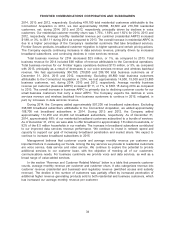Frontier Communications 2014 Annual Report Download - page 27
Download and view the complete annual report
Please find page 27 of the 2014 Frontier Communications annual report below. You can navigate through the pages in the report by either clicking on the pages listed below, or by using the keyword search tool below to find specific information within the annual report.$167 million, or 4%, of Frontier’s total revenues in 2013. State subsidies represented $32 million, or
1%, of Frontier’s total revenues in 2014 and $32 million, or 1%, in 2013. Surcharges to customers
(local, long distance and interconnection) to recover universal service fund contribution fees which are
remitted to the FCC and recorded as an expense in “Network related expenses,” represented $125
million, or 3%, of Frontier’s total revenues in 2014 and $118 million, or 2%, in 2013. As a result, a
significant decrease in these subsidies, or in our ability to recover such fees, could have a material
adverse effect on our business or results of operations.
Our Company and our industry will likely remain highly regulated, and we could incur
substantial compliance costs that could constrain our ability to compete in our target markets.
As an incumbent local exchange carrier, some of the services we offer are subject to significant
regulation from federal, state and local authorities. This regulation could impact our ability to change
our rates, especially on our basic voice services and our access rates, and could impose substantial
compliance costs on us. Regulation could constrain our ability to compete and, in some jurisdictions,
may restrict our ability to expand our service offerings. In addition, changes to the regulations that
govern our business (including any implementation of the 2011 Order or the 2013 Order) may have an
adverse effect on our business by reducing the allowable fees that we may charge, imposing additional
compliance costs, reducing the amount of subsidies or otherwise changing the nature of our operations
and the competition in our industry. At this time it is unknown how these regulations will affect
Frontier’s operations or ability to compete in the future. This and other FCC rulemakings and state
regulatory proceedings, including those relating to intercarrier compensation, universal service and
broadband services, could have a substantial adverse impact on our operations.
In addition, in connection with our Internet access offerings, we could become subject to laws and
regulations as they are adopted or applied to the Internet, including so-called “net neutrality” rules that
are intended to preserve the openness of the Internet. There is currently only limited regulation
applicable to these services. As the significance of the Internet expands, federal, state and local
governments may pass laws and adopt rules and regulations, or apply existing laws and regulations to
the Internet (including Internet access services), and related matters are under consideration in both
federal and state legislative and regulatory bodies. We cannot predict whether the outcome of pending
or future proceedings will prove beneficial or detrimental to our competitive position.
We may not be able to deploy or upgrade broadband service to the unserved and
underserved locations with the CAF funds received.
In 2012 and early 2013, we received $72 million from the first round of CAF Phase I, which
supports broadband deployment in high-cost areas. If we are unable to deploy to the 92,877 unserved
locations with the CAF funds received to date in accordance with the FCC rules by July 2015, then the
Company would need to incur additional capital expenditures or refund a portion of the CAF funds
received in 2012 and 2013 to the FCC.
In 2013 and early 2014, we received $61 million in the second round of CAF Phase I funding to
enable 101,714 households by March 2017. The second round of CAF Phase I includes certain
accompanying spending requirements from the Company, and our capital expenditure plans take this
into account.
Risks Related to Technology
We may be unable to meet the technological needs or expectations of our customers, and
may lose customers as a result.
The communications industry is subject to significant changes in technology and replacing or
upgrading our infrastructure to keep pace with such technological changes could result in significant
capital expenditures. If we do not replace or upgrade technology and equipment as necessary, we may
be unable to compete effectively because we will not be able to meet the needs or expectations of our
customers.
26
FRONTIER COMMUNICATIONS CORPORATION AND SUBSIDIARIES


